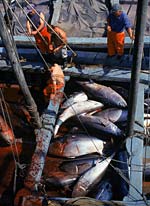   | |
|
Welcome to Mission 2011 Final Presentation
Live webcast of the Final Presentation is
on:
Tuesday, Dec. 4th
Note that the webcast will start promptly at 7pm and the doors
will be closed. 6:45 PM in MIT 32-123. Please choose the speed of the connection below. The final presentation will remain on the web after the initial broadcast. The website developed by the students in Mission 2011 with the work that embodies the whole semester is: http://web.mit.edu/12.000/www/m2011/finalwebsite/
About Mission 2011:
 Solving Complex
Problems (12.000) is designed to provide students the opportunity to work as
part of a team to propose solutions to a complex problem that requires an interdisciplinary
approach. For the students of the Class of 2011, 12.000 will revolve around the
issues associated with the possible collapse of the global fisheries brought
on by overfishing, climate change, pollution, and habitat destruction. Fish provide
roughly 40 per cent of the protein consumed by nearly two-thirds of the world's
population. Global population growth and improved fishing technology are placing
unprecedented pressure on the world’s ocean resources. Much overfishing
is being driven by the demands of the wealthiest nations and, unless controlled,
threatens the survival of developing countries. Global marine fish production
increased
from 19 million tons in 1950 to about 80 million tons in the mid-1980s where
it has remained. Chronic overfishing – combined with introduced species
and massive pollution – have upset ecological balance, destroyed habitat,
and created large "dead zones". When projections of global warming
and climate change are added to the mix, it is clear we are in severe crisis.
A global plan to save the oceans and the fisheries is long overdue and essential
for the planet. Your task is to develop this plan – the future of the planet
hangs in the balance. Solving Complex
Problems (12.000) is designed to provide students the opportunity to work as
part of a team to propose solutions to a complex problem that requires an interdisciplinary
approach. For the students of the Class of 2011, 12.000 will revolve around the
issues associated with the possible collapse of the global fisheries brought
on by overfishing, climate change, pollution, and habitat destruction. Fish provide
roughly 40 per cent of the protein consumed by nearly two-thirds of the world's
population. Global population growth and improved fishing technology are placing
unprecedented pressure on the world’s ocean resources. Much overfishing
is being driven by the demands of the wealthiest nations and, unless controlled,
threatens the survival of developing countries. Global marine fish production
increased
from 19 million tons in 1950 to about 80 million tons in the mid-1980s where
it has remained. Chronic overfishing – combined with introduced species
and massive pollution – have upset ecological balance, destroyed habitat,
and created large "dead zones". When projections of global warming
and climate change are added to the mix, it is clear we are in severe crisis.
A global plan to save the oceans and the fisheries is long overdue and essential
for the planet. Your task is to develop this plan – the future of the planet
hangs in the balance. You will have the unique opportunity to make a difference by contributing to the international debate revolving around the demise of the global fisheries. Fish no longer can be viewed as a renewable resource and many species have been fished to the brink of extinction. Fishing practices, while fantastically efficient, destroy habitat, kill less desirable species, and have dangerously depleted key fish stocks. It is estimated that the stocks of large commercial species in the North Atlantic have been depleted by as much as 90% since the mid 19th century. We must act and do so quickly. How do we best assess the state of the fisheries, how can we manage this vital resource? How do we achieve international cooperation? What strategies can we employ to allow key fish populations to recover? Fish farming has developed rapidly in the past several decades but with it have come a whole new set of problems including pesticide and heavy metal accumulations, genetic modification of farmed fish, and the possibility of creating diseases that can cross species barriers and infect wild populations. Is there a way to safely farm fish? Students in 12.000 will be responsible for developing and articulating a comprehensive plan for the future of the global fisheries and should address questions that include, but are not limited to, the following. Students of all backgrounds and interests will work in teams toward a solution which will be presented and web cast at the end of the semester in front of a panel of prestigious judges and the entire MIT community. |
|
   |